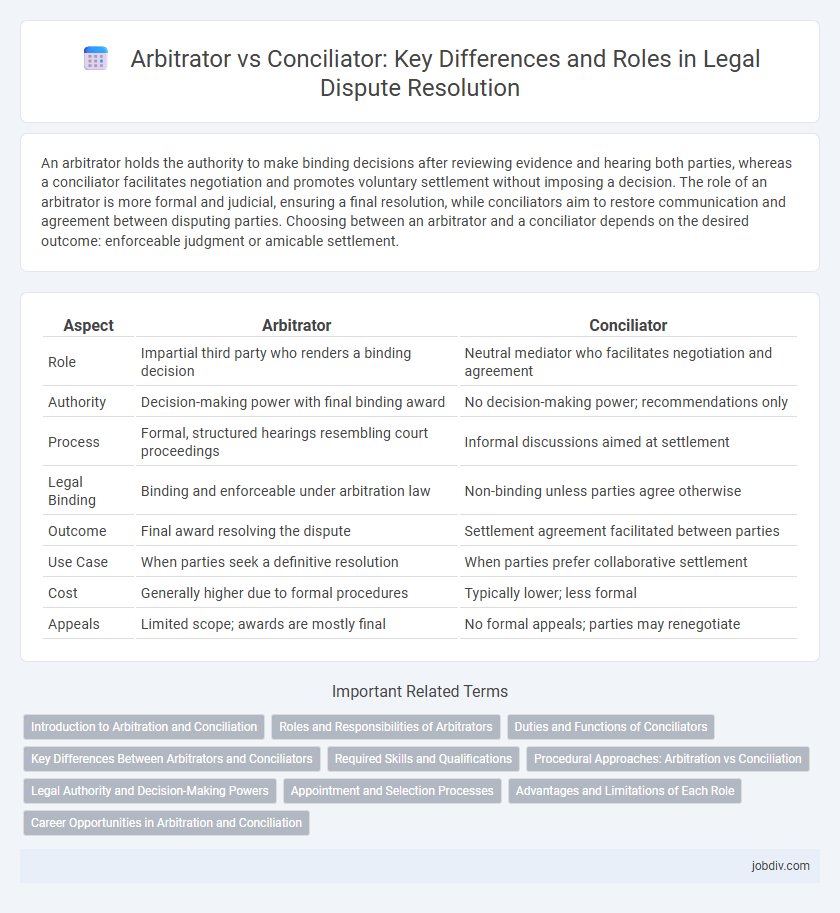An arbitrator holds the authority to make binding decisions after reviewing evidence and hearing both parties, whereas a conciliator facilitates negotiation and promotes voluntary settlement without imposing a decision. The role of an arbitrator is more formal and judicial, ensuring a final resolution, while conciliators aim to restore communication and agreement between disputing parties. Choosing between an arbitrator and a conciliator depends on the desired outcome: enforceable judgment or amicable settlement.
Table of Comparison
| Aspect | Arbitrator | Conciliator |
|---|---|---|
| Role | Impartial third party who renders a binding decision | Neutral mediator who facilitates negotiation and agreement |
| Authority | Decision-making power with final binding award | No decision-making power; recommendations only |
| Process | Formal, structured hearings resembling court proceedings | Informal discussions aimed at settlement |
| Legal Binding | Binding and enforceable under arbitration law | Non-binding unless parties agree otherwise |
| Outcome | Final award resolving the dispute | Settlement agreement facilitated between parties |
| Use Case | When parties seek a definitive resolution | When parties prefer collaborative settlement |
| Cost | Generally higher due to formal procedures | Typically lower; less formal |
| Appeals | Limited scope; awards are mostly final | No formal appeals; parties may renegotiate |
Introduction to Arbitration and Conciliation
Arbitration and conciliation are alternative dispute resolution methods designed to resolve conflicts outside traditional court systems. An arbitrator acts as a private judge whose decision is legally binding, while a conciliator facilitates negotiation between parties without imposing a decision. Both processes offer efficient, confidential, and cost-effective solutions for resolving commercial and legal disputes.
Roles and Responsibilities of Arbitrators
Arbitrators are responsible for impartially reviewing evidence, interpreting legal standards, and making binding decisions in dispute resolution processes. They conduct hearings, analyze testimonies, and draft awards that enforce contractual or statutory obligations. Their role requires adherence to procedural rules and legal principles to ensure fair and final outcomes.
Duties and Functions of Conciliators
Conciliators primarily facilitate communication between disputing parties to encourage voluntary agreements, focusing on resolving conflicts through mutual understanding rather than imposing decisions. Their duties include identifying key issues, suggesting potential solutions, and fostering a cooperative atmosphere to bridge differences. Unlike arbitrators who render binding rulings, conciliators emphasize negotiation and consensus-building to achieve amicable settlements.
Key Differences Between Arbitrators and Conciliators
Arbitrators render binding decisions after evaluating evidence and legal arguments in dispute resolution, whereas conciliators facilitate dialogue and propose non-binding solutions to help parties reach a mutual agreement. Arbitration procedures tend to be more formal, resembling court trials, while conciliation is less formal, focusing on cooperation and maintaining relationships. The enforceability of arbitration awards contrasts with the advisory nature of conciliator recommendations, making the role of arbitrators more authoritative in legal disputes.
Required Skills and Qualifications
Arbitrators must possess extensive legal knowledge, analytical skills, and the ability to make binding decisions, often requiring formal legal qualifications and certification in arbitration. Conciliators need strong interpersonal communication, negotiation abilities, and a deep understanding of conflict resolution principles, typically supported by training in mediation or dispute resolution. Both roles demand impartiality, cultural sensitivity, and expertise in managing complex disputes within legal frameworks.
Procedural Approaches: Arbitration vs Conciliation
Arbitrators conduct formal hearings governed by strict procedural rules, allowing evidence presentation and legal arguments to reach a binding decision enforceable by courts. Conciliators facilitate informal, flexible discussions aimed at fostering mutual agreement without imposing decisions, focusing on cooperation and voluntary settlement. The arbitration process emphasizes legal finality, while conciliation prioritizes preserving relationships through negotiated resolutions.
Legal Authority and Decision-Making Powers
An arbitrator holds binding legal authority to render decisions that parties must adhere to, often formalized through arbitration agreements or legal statutes. In contrast, a conciliator facilitates negotiation and dialogue without possessing the power to impose legally binding decisions, focusing on mutual agreement and dispute resolution. The arbitrator's rulings are enforceable in courts, whereas a conciliator's outcomes depend solely on voluntary compliance by the disputing parties.
Appointment and Selection Processes
Arbitrators are typically appointed through a formal selection process outlined in the arbitration agreement or by an appointing authority such as an arbitration institution, ensuring neutrality and expertise specific to the dispute. Conciliators are often selected by mutual agreement of the parties or appointed by a conciliatory body, emphasizing facilitation and voluntary agreement rather than binding decisions. The appointment of arbitrators involves stringent criteria to avoid conflicts of interest, whereas conciliators are chosen for their skills in negotiation and trust-building.
Advantages and Limitations of Each Role
An arbitrator delivers binding decisions, providing finality and enforceability, which ensures dispute resolution efficiency but limits flexibility and party control. A conciliator facilitates dialogue and promotes mutual agreement, enhancing cooperation and preserving relationships, yet lacks authority to impose decisions, which may prolong resolution. The arbitrator's role suits legal certainty while the conciliator is advantageous for voluntary, interest-based settlements.
Career Opportunities in Arbitration and Conciliation
Career opportunities in arbitration often require strong legal expertise and the ability to make binding decisions, making roles like arbitrators highly sought after in commercial and international dispute resolution. Conciliators focus on negotiation and facilitating agreements, offering career paths in mediation centers, governmental bodies, and corporate dispute resolution departments. Both roles demand specialized training in alternative dispute resolution, with arbitration typically providing higher remuneration and global mobility compared to conciliation.
Arbitrator vs Conciliator Infographic

 jobdiv.com
jobdiv.com